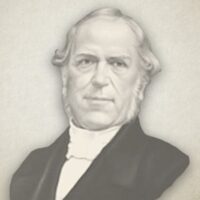
Chapter 14—On Communion, Answering The Charge Of Exclusivity
Mr. Bridgman: “I would ask that minister in all seriousness, Have you and your denomination exclusively the keys of the Church of Christ.”
My Reply:
In reply to this we say no; nor do we ever pretend to any such thing, “We are but servants, and our great Master’s word and the example of his first servants on his New Testament establishment, is our law, rule, and only authority of order and of action. We lock nothing up that the scriptures have not locked up, and we have got no keys to unlock what the word of God does not unlock, if you have. If that word be no law to you it is to us; and you have, for all what you have written to me on the point, got the whole of the proof entirely to make out, that you pay any regard to the authority of that word in your order of communion, and that we have not got both the letter and Spirit of that word for what you call our “schismatical communion.” If you can move upon a more convenient plan in the name of the Lord, than his word knows anything of, that is no reason why we should, or that such a practice should be silently justified. I have many times said from the pulpit before hundreds of people on the most public occasions, bring the authority of scripture for any order of communion and for anything in the name and place of believer’s baptism, and we will instantly agree therewith, and be of those sentiments in all good conscience before God and with all men. And I have told individuals the same in private, who have bitterly complained of our order; while they have not brought one single text to prove that it is wrong, or that any other is right. And why after all this, have not scriptures been brought to open our doors for us, in a way that in all good conscience on the Almighty’s word, we have no divine key, and are entirely ignorant of where to find one to open them ourselves ? We conclude it is because no such thing can be found in the word of God, and that people find fault with us, because they love their own lovely wide way better than they do the Lord’s unaccommodating narrow one; and then they cry us down as monstrous ugly, that they may pass for fair without authority. But after the above propositions having been made so repeatedly, surely no one ought to speak against us, until they have brought forward scriptures that will, in their sound meaning, stand against us. But, passing over what Antichrist has in various ways done, it is greatly to be lamented that now, with many whom we have reason to believe know better, the word of God is daily becoming the last and the least reference for authority, and rule of principles and order in the church of Christ. And which shews the importance of sacred advice saying—Abide in me. John 15:4. Little children, abide in him. 1 John 2:28. Keep yourselves from idols. Chap. 5:21.
You have written a long letter to me, but you have treated me as coolly as Simon the Pharisee did our Lord, for you have brought me neither water for my feet, nor ointment for my head, in one single text that is at all to the point in hand. Luke vii. But we shall expect you will find up something to your point, in the true meaning of the word of God if it be possible; or we shall conclude that you are on our side, just in the same way as Balaam was on Israel’s, when he said of the Lord, “He hath blessed, and I cannot reverse it.” Num. 23:20. And as Satan was on Job’s side, when he said to the Lord, “Hast not thou made a hedge about him?” Job 1:10. At present it does not appear by any shewing from your pen, that your attack on us is at all for how far we differ from the scriptures, but for how far we differ from you, and your multilateral plan; while you are unable to prove yourself right by the word of God, or us wrong on the point in hand.
John Foreman (1792-1872) was a Strict and Particular Baptist preacher. He was appointed the Pastor of Hill Street Chapel, Marylebone, serving this position for close to forty years.
JOHN FOREMAN'S LIFE AND MINISTRY
JOHN FOREMAN ON DUTY FAITH (COMPLETE)
JOHN FOREMAN'S BAPTISM AND COMMUNION CONSIDERED (COMPLETE)




